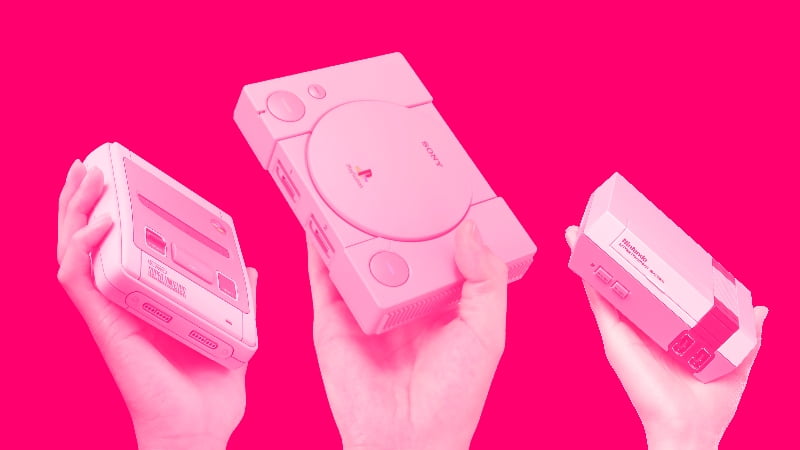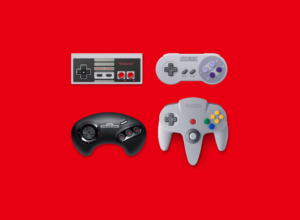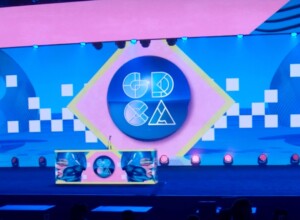The PlayStation Classic is bad, and so are the NES Classic Mini, SNES Classic Mini, and every other retro mini console for that matter.
It seems like a no-brainer, doesn’t it? An adorable miniature console pre-loaded with a treasure trove of classic games, with a price tag only slightly larger than one current generation game?
And the PlayStation Classic is really flipping adorable, just like Nintendo’s offerings. Nobody needs another device (or two, or three) taking up HDMI ports on their telly, but there’s something that just tugs at your shirtsleeves, stares at you with doe eyes, and says, “Please, won’t you take me home with you?”
They also provide an easy gift-buying answer to the question, “What do you get the gamer who has everything?” – of course, you get them something they absolutely don’t need but will definitely love, that’s simultaneously more personal than a retail game and more tangible than a PSN voucher.
It’s also hard to argue with the economics of mini consoles, from a consumer point of view. As a value proposition, it’s impressive. In the case of the PlayStation Classic – which, at the time of writing, has only five games confirmed – that’s four stone cold bangers (Final Fantasy VII, Ridge Racer Type 4, Tekken 3 and Wild Arms) for 90 quid. And Jumping Flash, for some reason.
If you bought these games at the time, those obsidian-faced CDs would have set you back the best part of £150. Even to pick them up now – at least, the ones that have been digitally reissued – might cost you as much as £12.99 for a single game. If you go hunting for good condition originals, you’ll be back up in the region of £100 again (a mint condition Wild Arms sells for £38 at CEX, for example, while a mint, non-platinum Final Fantasy VII will set you back £20).
Don’t forget: that’s just the games which have been announced thus far for the PlayStation Classic. If Sony can get Konami on board, we might be looking at Silent Hill and Metal Gear Solid on the roster. Square Enix is clearly playing ball, so expect to see Final Fantasy IX (but not VIII) and maybe the early Tomb Raiders; perhaps even games that never saw an EU release, like Chrono Cross, Final Fantasy Tactics, or Xenogears. Gran Turismo. PaRappa the Rapper. Colin McRae Rally. WipeOut. The list is massive.
It’s a smart move on Sony’s part. Nobody is talking about how good the four included games (and Jumping Flash) are on the PlayStation Classic, but they are all bickering over what the other 15 should be.
You could also argue, quite reasonably, that the PlayStation Classic (and all the other mini consoles) are opening up a forgotten era to a new generation of players. But wouldn’t it be great if everyone could play them, without locking that access into a limited release physical device?
We live in an age where you can download or stream pretty much anything, but Sony’s available back catalogue – at least for the PS4; the PS3 and PS Vita are better served – is woefully underrepresented. It shouldn’t be so bloody difficult to get hold of classics like Metal Gear Solid or Tekken 3, but here we are. Don’t even get me started on how bad Nintendo is for catalogue availability.
There’s no other entertainment medium in which classics are so difficult to buy and enjoy. There are finite numbers of vinyl records or vintage comic books or original run hardback novels out there, just like physical editions of retro games, which inevitably drives a collector’s market and steep prices. But unlike all of those others, if you can’t afford to – or don’t want to – engage in the collector’s game, you can get digital copies from almost every channel you can imagine.
This absence of access inevitably drives the desire for emulation. Sure, there are some out there who engage in emulation for piracy’s sake, the old “take what you can/give nothing back” refrain from Pirates of the Caribbean. But for the most part, fans engage in emulation because it’s the only realistic way to play these games.
If Sony (and Nintendo, and everyone else) made their games available to download for a small price, legitimately, people would absolutely pay. But to gate access to these games behind limited-run hardware purchases – and you know Nintendo thrives on this scarcity model – is an innovative new take on DRM, and simply creates further frustration. If they truly cared about digital preservation and showcasing their previous products in the best light, they’d make official emulated versions available for everyone to purchase. But the reason Nintendo drove a stake into the heart of emulation is because emulation hurts sales, of both its mini consoles and of the burgeoning NES Classic component of the Switch Online subscription.
What’s worse, in a world where Nintendo has finally stopped shipping a thousand different crap plastic peripherals and switched to a more eco-friendly alternative in Labo, is that mini consoles are generating tonnes of CO2. Again. In the production of the consoles. In their distribution. In their inevitable, unrecyclable end of life on landfill.
But that’s just the plastic.
All of these mini consoles – the PlayStation Classic, the NES and SNES Classic Mini – are effectively small single-board computers, like a Raspberry Pi or similar. This means they all require precious minerals to produce. And because precious minerals are so scarce, it’s little surprise that Nintendo can only guarantee that 76% of their minerals come from conflict-free sources. Sony is thought to be between 80 and 90% (though the exact figure isn’t known). But even if minerals used in electronic manufacture aren’t from conflict sources, they’re still a rare natural resource and, when disposed of, produce different pollution problems.
The most ridiculous part of all this is that with its ever-expanding backwards compatibility programme, Microsoft – they of the anti-competitive monopoly and software price-gouging in the enterprise space – proves that it is possible to offer access to retro games without novelty reissue mini consoles. If you already own a game, you can play it for free. If you don’t, you can buy it for a relatively low price from the Microsoft Store. It’s so simple.
So before you go and pre-order a PlayStation Classic – or heaven forbid, pay over the MSRP on eBay once they inevitably run out of stock at retail – have a think about whether you’re sending the right message to Sony and Nintendo about both the environment, and how you want to secure access to classic video games.







In a world where people are burning through new smartphone’s year over year, racing to switch out their Apple watch for the next years model, this environmental argument is a bit reaching. I reballed my PS3’s GPU with lead solder and I’ve yet to see any dead baby dolphins or infants with 11 fingers. This left-heavy California bullshit has to stop.
You seem to be missing the point somewhat, Blaine. It’s the unnecessary use of precious minerals that’s the issue. The fact you re-soldered your PS3 actually makes you one of the good guys – you took something that was going to go to landfill and kept it running. Kudos, you little eco-warrior!
But nobody actually needs classic mini consoles. If Sony or Nintendo wanted to they could make emulated or backwards compatible versions of their old games available. That would save everyone lots of money and be better for the environment all at once. As it stands, the only people who win from mini consoles are the corporations.
PS. We’re not from California! We’re actually from Britain, but we are unashamedly left-leaning, so you’re correct on that score.